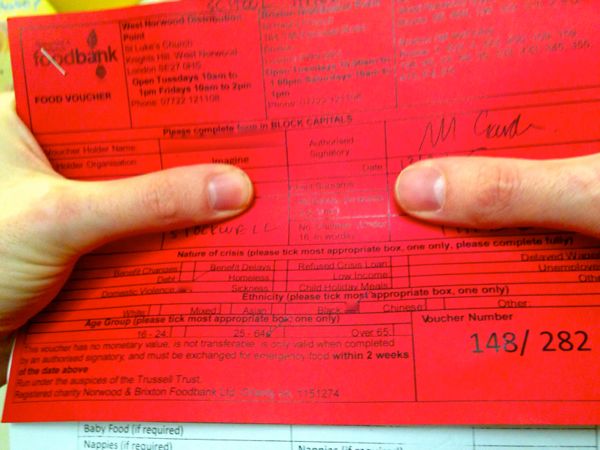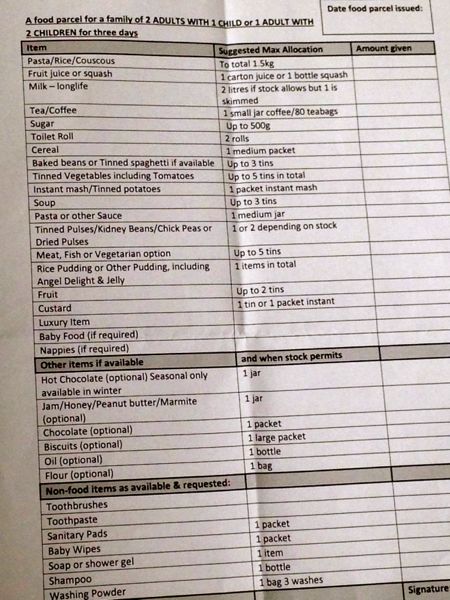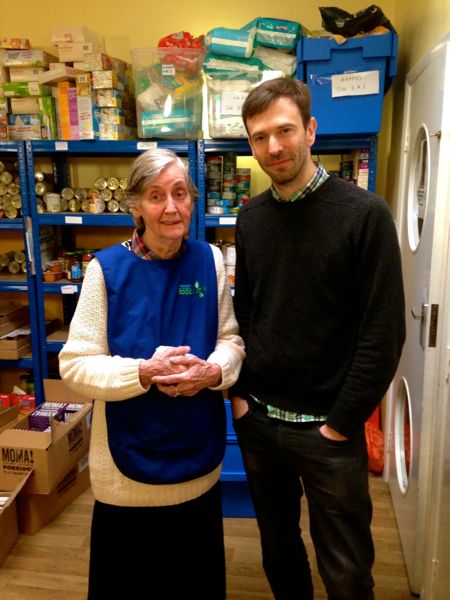
Written by Zofia Niemtus
It’s a cliche now to point out that the people using food banks are from all walks of life. Not just “those with drug, alcohol and mental problems” as Tory councillor Mark Winn suggested earlier this year, but people who were doing fine not long ago, and yet find themselves unable to cover basic living costs now. People like the tearful woman I speak to at the Brixton Food Bank on a Saturday morning. Two months ago she was living in Canada, where she had emigrated with her two children and husband, for his job. On Monday, the four of them will become homeless.
When her husband was suddenly made unemployed a year into the move, the family packed up and got flights back to the UK, where they had previously lived for 20 years and where both children – one aged 7, one who will be 4 next month – were born. They used what was left of their savings to get a room in a hotel in Clapham as a short-term measure while they looked for work. But now, with no jobs and no wages, that money has run out. They are not eligible for benefits, they have discovered, because they were out of the country for more than three months and returned with some savings (“Which have all gone,” she repeats).
And so her conversation with food bank manager Jon Taylor isn’t just about food; it is about options. If she can somehow get hold of £30 in the next two days, the family can get a private room in a hostel for the night. For £12, they can get beds in a room shared with strangers. They talk about what will happen if the family does have to sleep on the street. She keeps crying. Jon recommends that she speak to the Brixton Advice Centre – she says she is already doing that. “They’re good,” he tells her. “They will help you.”
Later on, he explains that this is what the food bank is about; giving people what they need to keep going, but finding solutions too. The referral slips (handed out by doctors, teachers and other community professionals) ask people how they have come to need the service – the list of options includes domestic violence, debt, sickness, sanctions and benefit delays. Jon shows me the hefty booklet used by volunteers in their conversations with clients – it is full of contact details for charities, advice services and hostels. At least one member of staff from the Brixton Advice Centre is on hand at every session, most commonly dealing with changes to benefits especially the bedroom tax and removal of Council Tax Benefit.
“We get people who have no recourse to public funds at all,” Jon continues. “It’s often due to immigration status, and in those situations we do what we can. They’re here with absolutely no money from the government and they are literally starving.”
Then there are those with more complex, long-term issues, like one man I meet who was referred here by his social worker. He is 31, but seems much younger. He explains that he has no money for food – he is getting a pack today, but has other issues to contend with.
“I can cook,” he says, “but not in my kitchen at the moment. I don’t have a good cooker and I’ve got no pans or pots. But I’m going to sort it out soon.”
This is a common issue, Jon confirms since the abolition of the Social Fund that helped provide money for costs of living. “When people come, we ask about their cooking facilities,” he says. “But what we’re finding is that a lot of people haven’t actually got them. Or they haven’t got the money to put on the gas or electricity meter.”
The food bank runs two sessions a week, one on a Tuesday, one on a Saturday. The Brixton and Norwood operation is the biggest in London – last year it fed more than any other borough, rising 31 per cent from the previous year. These are “not stats to be proud of”, Jon says.
The packs – put together entirely from items donated by the public – are designed to provide the healthiest possible diet of non-perishable items. There’s always pasta, Jon explains, but they are running low on pulses and tinned fruit and vegetables. There are, somewhat incongruously, boxes of Gu puddings and Lindt chocolates donated by businesses. Then there are the other items, every bit as vital as food – nappies, toilet rolls and sanitary towels.

This food bank helped 298 people in January alone; Jon estimates that it will reach 6,000 by the end of the year. The generosity of the community is remarkable, he says. In the month before Christmas, one anonymous donor gave £100 of turkey a week. The donation bins in local supermarkets are regularly filled and the managers are supportive.
But more is needed. Donations are always welcome – the website lists the items that are most urgently required. As demand for the service continues to grow, operational issues are arising too – they desperately need drivers to ferry supplies around Brixton, or help to sort them in the ‘warehouse’ (a church in Streatham). Fundraising is an ongoing concern too, with no government assistance provided.

Former MP Michael Portillo claimed last year that the rise in food bank use did not mean that people were going hungry, but that they were “relieving pressure on the family budget”. I put the idea to Jon, who looks bemused. “That’s ridiculous,” he says. “People are embarrassed to come here, they don’t do it out of choice. I don’t think he understands how the system works.”
Brixton and Norwood Foodbank are currently welcoming donations of food, toiletries (particularly men’s) and Easter items such as chocolate eggs or sweets to add a little normality to people’s lives.
If you are experiencing issues with debt, benefit changes, delays or sanctions or other financial issues whilst in work you can contact Brixton Advice Centre at 165-167 Railton Road, London SE24 0LU or on 020 7733 7554. Lambeth Council also offer advice through Every Pound Counts and Olive Morris House. You must be referred to the foodbank by social services, an advice worker, GP, health visitor or the police and attend with a voucher.
Zofia tweets at @zofcha














So a decrease in one kind of hand-out has led to an increase in another type of hand-out. What is the moral difference between the two?
@ Richard – very well said. Any Tory or Lib Dem remotely concerned about the welfare of ordinary human beings or animals should have the decency to defect. They’re a disgrace to our species, never mind our electoral system.
Interesting how a Conservative Councillor comments on food banks. It is his political masters at Westminster who are responsible for the rise in food banks with their cuts on the poorest in society with for example the Bedroom Tax as a fine example. We have the Liberal Democrats, no matter how hard they try to distance themselves from this law, that supported this legislation plus other hard hitting laws, along with their new found Conservative chums. This article clearly shows that we are far from being in it together. The Liberal Democrats harp on about a fairer society and like their promise not to increase tuition fees this is pure fantasy and merely meaningless words. Both these political parties especially the Liberal Democrats should be ashamed that they leave a legacy, such as food banks, ater 5 years in office. Certainly nowhere near a fairer Britain.